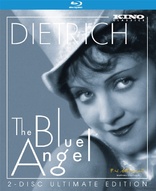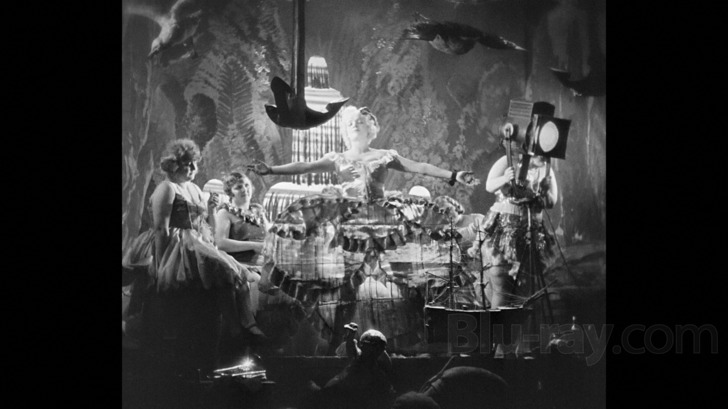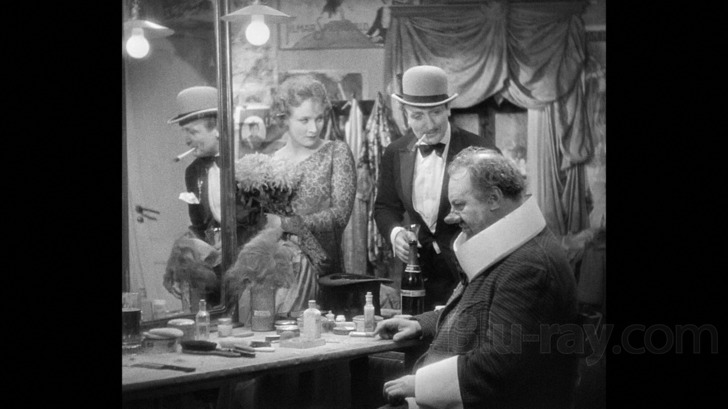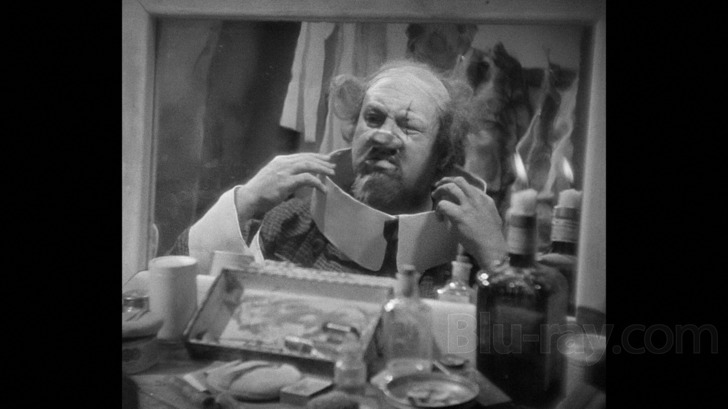The Blue Angel Blu-ray Movie
HomeThe Blue Angel Blu-ray Movie 
Kino Classics 2-Disc Ultimate Edition / Der blaue EngelKino Lorber | 1930 | 1 Movie, 2 Cuts | 107 min | Not rated | Dec 17, 2013

Movie rating
7.5 | / 10 |
Blu-ray rating
| Users | 0.0 | |
| Reviewer | 4.0 | |
| Overall | 4.0 |
Overview
The Blue Angel (1930)
Professor Immanuel Rath, the sexually-repressed instructor of a boys' prep school, after learning of the pupils' infatuation with French postcards depicting a local nightclub songstress, decides to personally investigate the source of such indecency. But as soon as he enters the shadowy Blue Angel nightclub and steals one glimpse of the smoldering Lola-Lola, commanding the stage in a top hat, stockings and bare thighs, Rath's self-righteous piety is crushed. He finds himself fatefully seduced by the throaty voice of the vulgar siren, singing "Falling in Love Again." Consumed by desire and tormented by his rigid propriety, Professor Rath allows himself to be dragged down a path of personal degradation.
Starring: Emil Jannings, Marlene Dietrich, Kurt Gerron, Hans Albers, Rosa ValettiDirector: Josef von Sternberg
| Foreign | 100% |
| Drama | 68% |
| Romance | 40% |
| Music | 8% |
| Melodrama | 1% |
Specifications
Video
Video codec: MPEG-4 AVC
Video resolution: 1080p
Aspect ratio: 1.19:1
Original aspect ratio: 1.2:1
Audio
German: LPCM 2.0
English: LPCM 2.0
Subtitles
English
Discs
25GB Blu-ray Disc
Two-disc set (2 BDs)
Playback
Region A (B, C untested)
Review
Rating summary
| Movie | 4.0 | |
| Video | 3.5 | |
| Audio | 3.5 | |
| Extras | 3.0 | |
| Overall | 4.0 |
The Blue Angel Blu-ray Movie Review
Lola, Lo-Lo-Lo-Lo-Lola
Reviewed by Casey Broadwater December 9, 2013Strutting about onstage in stockings and garters, her bare thighs cheekily peeking out from under a short ruffled skirt, Marlene Dietrich became a near-
instant international sex symbol because of her cabaret queen role in 1930's Der blaue Engel—a.k.a. The Blue Angel—a comic drama
that was one of Germany's first major "talkies." It was also Dietrich's first film with the Austrian-American director Joseph von Sternberg, who would
sculpt and re-sculpt her public image in six subsequent Hollywood movies, including Shanghai Express, Blonde Venus, and The
Scarlet Empress.
The Ufa Studios-produced project initially materialized out of a collaboration with Swiss-born actor Emil Jannings, who had previous starred in Von
Sternberg's 1928 silent film, The Last Command, winning the very first Academy Award for Best Actor. Though the two famously didn't get
along, they eventually reconciled, and Jannings temporarily wooed Von Sternberg away from Los Angeles to make The Blue Angel in Berlin,
shooting German and English versions simultaneously. The German cut is better known, partially because the actors are better in their native language,
but also because the English edition was presumed lost for decades. Visually and thematically speaking, the differences between the two are superficial—
amounting to slightly different takes and a few modifications for American audiences—but having both available is invaluable for fans, critics, and film
historians.
A few years ago, Kino-Lorber did make both version available on DVD, in a two-disc set that also included an audio commentary, Dietrich's original
screen test, a short interview, and footage of Dietrich performing songs from the film in the 1960s and '70s. Last December, though, when Kino first
released the film on Blu-ray, the special features were dropped entirely and only the German cut was presented, leaving the film's fans in the lurch,
unsure whether to buy the single-disc release or hold out for some hypothetical "ultimate edition" in the indeterminate future. It looks like the hold-
outs made the right move; one year later, Kino is reissuing the film on Blu-ray, with both cuts and most of the special features restored. If you've yet to
buy the film, this is clearly the edition to get, but it's less certain whether a double-dip is warranted for those who already have The Blue Angel
on their Blu-ray shelves. The best supplement from the DVD set, the audio commentary, is still weirdly missing—presumably the rights were lost—and
the other extras are by no means essential viewing. Still, while the German version is arguably the better film, the English version arguably (and
marginally) looks better in high definition, which may sway some to a second purchase.

Naughty Lola
Loosely based on Heinrich Mann's 1905 novel, Professor Unrat, The Blue Angel follows the well-worn storyline of an upstanding man falling for a lady of less-than-healthy repute. It's hardly an original premise, but Von Sternberg uses it to tease out powerful themes of humiliation and middle-class hypocrisy. Emil Jannings plays Dr. Prof. Immanuel Rath, a pious old bachelor who teaches English literature at an all-boys college prep school, where he chews out his students for minor linguistic infractions—like pronouncing "the" as "zee" in Hamlet's "that is the question" soliloquy— and generally fulfills the role of the fusty, unlikeable authority figure. Minus one bespectacled teacher's pet, all his pupils treat him as such, routinely disrespecting him behind his back. Rath's moral outrage spurs him to action when he discovers that several of the boys have been sneaking nightly into The Blue Angel, a local cabaret headlined by the leggy Lola Lola (Marlene Dietrich), whose suggestive song-and-dance routine is the stuff of adolescent fantasy.
As it turns out, Rath himself is just as susceptible to Lola's ample—shall we say—charms. The do-gooder enters the club infuriated, intending to storm backstage and give the burlesque artist a firm talk about how she's corrupting the town's youth, but he's such a comic fish out of water that he can barely get a word in. Bumbling around her dressing room as Lola changes outfits between acts, the professor's righteous anger turns to sputtering embarrassment, and from there mellows out into gawking, floating-on-clouds infatuation. It's a tremendous performance from Jannings—who's funny simply by the merit of playing the part as straight as possible—and his Rath is soon deeply, inextricably in love with Lola, despite the sizable difference in their age and social status.
The low-key comedy of the first half peaks with a giddy wedding—Rath wants to legitimatize Lola, while she simply appreciates that he defends her honor—but the film eventually gives way to regret and envy and disillusionment, charting Rath's downward spiral from an esteemed citizen to a depressed, cuckolded magician's assistant on the cabaret circuit, taking eggs and pies to the face for jeering crowds while his wife locks lips with a younger, more handsome man offstage. Lola may have once looked into Rath's eyes while mouthing the words to her signature tune, "Falling in Love Again," but post-marriage, she's cruel and distant, rarely willing to even meet his gaze.
If Dietrich is good as the languid burlesque sexpot—and she is; her memorable performance was worthy of a parody homage by Madeline Khan as Lili von Shtupp in Blazing Saddles—she's even better as the married-for-years-and-emotionally-remote frau who does what she wants and has no respect for her tottering husband. Superficially, the moral here might seem to be the old, borderline-misogynistic quip, "Never make a pretty woman your wife," but the deeper insight is that those who condescendingly hold themselves to higher standards are often the most easily undone by their own desires.
Speaking of downfalls, while Marlene Dietrich's career took off in America, Emil Jannings' own took a shameful turn, as he went on to star in several Nazi propaganda films, was named "Artist of the State" by Joseph Goebbels, and was later promoted to head of Tobis, one of the major movie production companies of the Third Reich. If you watch carefully, you can see a fictionalized version of Jannings—played by Hilmar Eichhorn—die in the cinema inferno at the end of Quentin Tarantino's Inglourious Basterds. In real life, the actor/producer was removed from the German film industry during the Allies' post-war denazification period and retired to Austria, where he died of liver cancer in 1950.
The Blue Angel Blu-ray Movie, Video Quality 

What I previously wrote about the German version still stands: Newly restored in high definition by the Friedrich-Wilhelm-Murnau Institute—the same
folks who oversaw the recent restoration of Fritz Lang's Metropolis—Blue Angel alights on Blu-ray with a satisfying 1080p/AVC-encoded
presentation. Sourced from archival 35mm elements, the image fully retains its natural filmic look here, with a visible grain structure and no traces of
adverse digital noise reduction or edge enhancement. While the film hasn't quite been given the same level of frame-by-frame restorative polish as
Metropolis, the print has been decently cleaned up, with comparatively few white specks and small scratches for a movie from 1930. There is
some age-related damage—occasional vertical scratches, slight brightness fluctuations, some brief warping and staining—but nothing out of the ordinary if
you're used to watching films from this era. Those who owned Kino's previous Blue Angel DVD will notice an appreciable upgrade in clarity, even if
the picture—on the whole—is a bit soft, with a chunky grain pattern that inherently limits the resolution of fine textures. Aside from the mild
aforementioned flickering—which is quite hard to correct digitally—the film's black and white photography is handled well, with a good contrast balance
that neither crushes shadow detail nor blows out highlights. All around, a very watchable transfer.
In my opinion—and this is a subjective thing—the English-language version actually looks ever so slightly better. It's a bit brighter than the German cut,
but when you examine them side-by-side, the contrast in the English version seems a hair more natural, with less black crush. The level of clarity is
moderately higher too, although not to the extent that you'd notice a difference from a normal viewing distance. I tried to capture similar scenes in the
screenshots—images 1-10 are from the English version and 11-20 from the German cut—and if you compare them, you might notice some sharper lines
and finer textures in the English transfer. Otherwise, the two encodes are much alike, with "natural" restorations, light print damage, and no major
compression issues.
The Blue Angel Blu-ray Movie, Audio Quality 

Kino has given equal treatment to the German and English editions of The Blue Angel, presenting them both with uncompressed Linear PCM 2.0 mono tracks. Considering this is an 82-year-old film and one of Germany's earliest talkies, there are obviously some unavoidable limitations in sound quality here. Audio-wise, the two cuts are not substantially different. You'll notice a low-but-persistent background hiss if you're listening for it, occasional pops and crackles, and some harshness/muffling in the vocals, but nothing grating or distracting in the slightest. The real highlight here is Marlene Dietrich's musical numbers, including "They Call Me Naughty Lola," and the famous, oft-covered "Falling in Love Again." The German disc includes optional English subtitles, which appear in easy to read white lettering with black borders, but there are no subtitle options for the English disc, which is unfortunate considering the semi-intelligible thickness of Emil Jannings' accent at times.
The Blue Angel Blu-ray Movie, Special Features and Extras 

A certain improvement over last year's bare-boned edition, Kino's new two-disc "ultimate edition" is still somewhat frustrating, as the distributor has apparently lost the rights to the excellent audio commentary by Berlin film scholar Werner Sudendorf. Otherwise, everything else from the previous DVD set has been ported over:
- Scene Comparison (SD, 3:13): A look at the differences between the German and English versions, looking at an early scene where the professor enters his classroom, blows his nose, and calls one student to the front of the class.
- Marlene's Screen Test (SD, 3:39): Sultry Dietrich smokes a cigarette and sings "You're the Cream in My Coffee." Made in 1929 at the Babelsberger studios.
- Dietrich Archival Footage (SD): Here you'll find a short clip from a 1971 interview (1:27) relating to The Blue Angel, a 1963 performance of "Falling in Love Again" (3:28), and 1972 performances of "You're the Cream in My Coffee" (3:32) and "Lola" (2:15).
- Trailers (SD): Includes a 1930s-era trailer (3:43) and one from a re-release in the 1960s (3:02).
- Image Gallery: A user-directed gallery with sixteen stills, posters, and promo images.
The Blue Angel Blu-ray Movie, Overall Score and Recommendation 

A tragi-comic study in social downfall and humiliation, Joseph von Sternberg's The Blue Angel is one of the highlights of Weimar-era cinema. Though Emil Jennings delivers a fine performance as the nominal star, the film is best remembered for launching the sultry Marlene Dietrich to international fame and iconic sexpot status. With this new "ultimate edition," which includes both cuts of the film and most of the supplements from the older DVD set, Kino is righting the wrongs of last year's single-disc, German-only Blu-ray release, which didn't include any supplementary material. Whether the ol' double-dip is worth the money will be a personal decision—the English cut, in my opinion, does look slightly better in high definition than the German version—but if you don't yet own the film, this is definitely the version to get. Recommended.
Similar titles
Similar titles you might also like

Happy Together
春光乍洩 / Chun gwong cha sit
1997

Written on the Wind
1956

Black Orpheus
Orfeu negro
1959

Loveless
Нелюбовь / Nelyubov
2017

I Am Love
Io sono l'amore
2009

Rust and Bone
De rouille et d'os
2012

The Earrings of Madame de...
Madame de...
1953

About Elly
Darbareye Elly
2009

Birds of Passage
Pájaros de verano
2018

The Rules of the Game 4K
La règle du jeu
1939

Damnation
Kárhozat
1988

Sunrise
Sunrise: A Song of Two Humans
1927

Le Amiche
1955

Jean de Florette
1986

Talk to Her
Hable con ella
2002

Summer Interlude
Sommarlek
1951

La signora senza camelie
1953

The Red Shoes 4K
1948

The Bitter Tears of Petra von Kant
Die bitteren Tränen der Petra von Kant
1972

Saraband
2003
